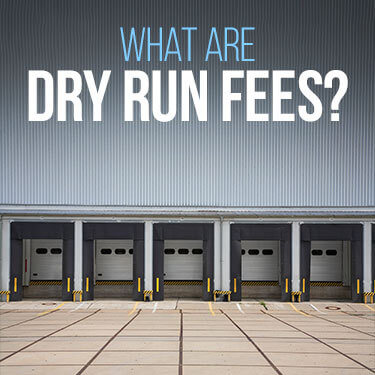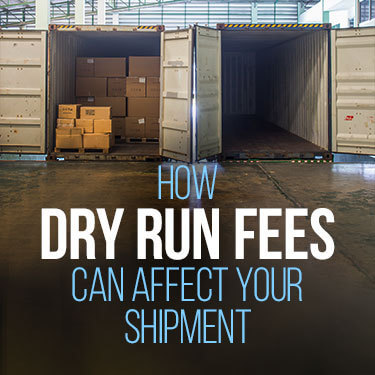When shipping products domestically or internationally, the failure to pick up a load on time will result in dry run fees. When this happens, the carrier must make an additional trip to pick up the missed cargo, and the shipper gets charged for the extra trip.
Dry run fees are charged by carriers for the failure of a shipper to provide a load for pickup on time. This can happen as a result of miscommunication, tardiness, or a failed cargo release. Dry run fees typically cost $75-$150 per run. These fees can be charged in addition to accessorial fees, such as demurrage and detention.
Find out what precisely dry run fees are, including the unwanted side effects in our full breakdown here.

When an uncompleted load occurs in trucking, fees are added to the transaction. These dry run fees often stem from issues related to misinformation or an error in processing. A dry run fee can also result from a missed pickup due to the late arrival of the freight vehicle when the load is ready for pickup.
The resulting fee caused by a dry run can happen at any facility that a carrier is slated to arrive at when picking up a load. Dry runs typically occur at ocean ports, warehouses, or during drayage. The failure to release cargo at any one of these pickup points can result in a dry run.
The carrier tasked with picking up and transporting the cargo will charge a dry run fee when an error occurs. Dry run fees represent a driver's gas, time, and labor. The carrier often charges the fee due to a missed pickup or when a pickup is not ready for the arriving truck. The purpose of this fee is to accommodate the driver of the shipment that failed to take place.

Dry run fees are charged at the carrier's discretion. Nevertheless, the likelihood of a charge by the carrier for a dry run is high when the shipper is unprepared. When a shipper is directly responsible for the missed load pickup, the carrier will almost always charge a fee.
The dry run charge will vary depending on the carrier and whether or not they choose to apply the charge to your billing statement in the first place. If the fee is charged, there are several factors that the carrier may take into account.
Sample data suggests that the average cost of a dry run is between $75-$150 per run. It is also important to note that specific administrative fees may also be added to the dry run. These factors form an additional administrative charge, including the following costs:
If cancelation occurs, typically within 24hours before the scheduled load pickup, a dry run fee can, and usually will, be accessed. In addition to that fee, the charges outlined above will generally result in accessorial fees.

The overall effect of a dry run in shipment-related issues is the increased overall cost. Besides the initial dry run fee, which is a direct result of an additional trip made by the carrier, every step in the shipment suffers.
Primarily, a dry run will affect the cost of shipping your cargo. A side effect of a dry run is also a natural delay in shipping. Port congestion and delays at distribution centers can all occur as a result.
When a truck has to wait for the port to clear to re-establish a load, this will affect the shipment. The downside is the buildup of additional fees and costs, as well as the potential delays that will naturally happen due to a domino effect.
The breakdown goes well beyond the cost of a dry run. Additional time for the truck gets spent waiting on a shipment to get loaded, bringing more fees.

Within the realm of international shipping, anything can happen. The shipping industry is unpredictable, ever-changing, and complex. Additional fees can and will occur, and it is essential to be mindful of such expenses that can accrue over the course of a shipment.
As mentioned earlier, administrative fees will get added to your billing summary. This fee is separate from accessorial costs like detention charges that can also result from a dry run.
Another charge caused by poor planning and preparation is a demurrage charge. This additional fee will happen if you fail to pick up your load before the port's last free day.
Careful planning and communication with the port will help avoid the additional fee that comes along after failing to pick up your load on time. Being unprepared for a shipment is the single most significant cause for any associated fees in shipping.
A detention fee is typically an after-effect of a dry run fee. This fee is an accessorial charge that happens when the truck assigned to pick up the load has not arrived, is held up due to congestion, or has missed the free time window.
The cost surrounding detention fees will vary but typically costs between $50-$100. This occurrence of detention fees rarely happens in Less Than Truckload (LTL) shipping, where a DRF is all that will occur. However, in Full Truckload (FTL) shipping, this method of shipping has multiple pickup and deliveries.
Finding a carrier with an adequate drayage solution is the best way to avoid a dry run which can lead to a potential detention charge. The turnaround times at the ports are ever-increasing due to chassis shortages and massive port congestion.
The information below shows port congestion and the effects of turnaround time due to the global pandemic.
Take note of the surge in turnaround time between July 2020 and January 2021. However, it did not begin to affect international shipping and trade until closer to the spring of 2020. It is essential to take great care of the always-changing conditions at the ports to avoid dry run fees and other related charges.
| Date | Turn Times | Percent of Moves |
| January 2019 | 90 mins | 30% |
| July 2019 | 81 mins | 25% |
| January 2020 | 70 mins | 23% |
| July 2020 | 59 mins | 19% |
| January 2021 | 95 mins | 32% |
Source: joc.com
When a demurrage charge happens, the shipment was left longer than intended because of a missed pickup or miscommunication. This charge will occur after the last free day.
Due to port congestion, the likelihood of load delays in shipments is very high. So, given this statement, careful planning and execution are required so that this particular charge does not happen to you.
Once a dry run occurs and no attention is given to the load, the costs will increase over time. We have an excellent article with detailed information regarding demurrage charges and how to avoid them that you should take a look at concerning these fees. The following is an example of the daily demurrage charges at the Port of Los Angeles.
| Container Type | Day 1 - 4 | Day 5 |
| 20 Foot Container | $21.80 | $43.60 |
| 40 Foot Container | $43.68 | $87.32 |
Source: joc.com
Several strategies can help you avoid a dry run and any associated fees that may result. There are three main concepts to implement to avoid a DRF and accessorial fees.
It is important to note that in any case, utilizing a trusted third-party logistics (3PL) provider is the best option. The main benefit to a 3PL comes from its ability to control every detail of your shipment. With internal systems, operational management, and fleet management, the reduction of potential error is greatly reduced.
The flipside to any delay is that cargo loading has become faster and more efficient. Trucks do have the option of staying overnight and conducting a pre-pull to avoid an extra trip. This overnight load can keep the delivery in the timeline of the shipper.
Of course, excellent shipping management can and will save the day, helping you avoid those unwelcome dry run fees and other accessorial charges. Naturally, a dry run and additional fees can become unavoidable in some cases. A solid management team can help facilitate your shipment while reducing this risk.
Dealing with dry runs and their fees can be cumbersome and potentially become a significant expense. The global pandemic continues to plague shipping and distribution. Ocean ports are still ripe with congestion and long turnaround times.
USA Truckload Shipping, powered by R+L Global Logistics, is ready to provide you with best-in-class shipping solutions. Our friendly experts can get your cargo out of the port quickly and without accruing unnecessary dry run, detention, or demurrage fees. Call us at (866) 353-7178, and let us handle your shipment with an unmatched service that only R+L Global Logistics can provide.
R+L Global Logistics
315 NE 14th St., Ocala, FL 34470